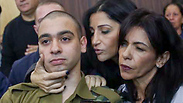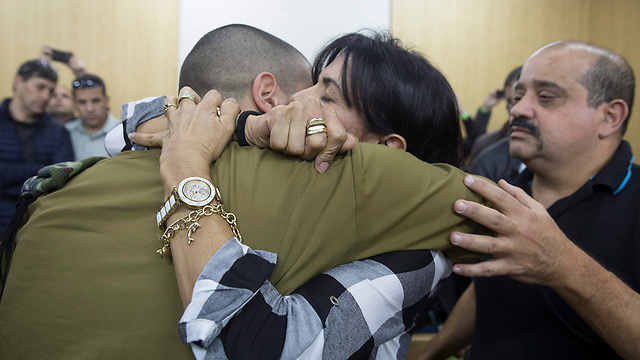
A soldier must not be deserted at the court, even if he erred
צילום: מרים אלסטר/פלאש90
Not a drop of compassion at the military court
Op-ed: Elor Azaria made an error in judgement, there is no doubt about it, but the judges failed to see before their eyes a young soldier who was sent on a difficult mission in an impossible reality.
Not a single word of compassion was heard from the panel of judges at the military court in Tel Aviv towards IDF soldier Elor Azaria or towards his family throughout the entire reading of the verdict. If they had even the slightest sensitivity, they would not have stood there and read the ruling for two and a half hours, without providing the bottom line at the very beginning: Guilty. Reading 309 clauses of the ruling while keeping the soldier in terrible suspense symbolizes the court’s humiliating attitude.

The judges did not see before their eyes a young soldier who was sent on a difficult mission in an impossible reality. They did not see a shocked soldier attending to his wounded friend, who was in a state of deep fear several minutes earlier. How could this panel express any solidarity or empathy, if most of its members never experienced a combat situation?
And that is the essence of the injustice: Retroactively judging—inside a protected and air-conditioned courtroom—something that happened in a chaotic reality, while turning their backs on a person who was sent to the battlefield to defend us all.

Elor Azaria with his parents following the ruling. He did not choose to be in the place he was in; the IDF sent him there, and the IDF betrayed him (Photo: EPA) (צילום: EPA)
A public that neglects its emissaries at moments of crisis and difficulty is a cruel public. A wounded soldier must not be deserted on the ground. A captive soldier must not be deserted either, even if he was caught off guard in a tank. And a soldier must not be deserted at the courtroom, even if he erred.
The court forgot that soldiers are human beings too, creatures who tend to make mistakes and fail. Elor Azaria made an error in judgement, there is no doubt about it, either intentionally or mistakenly. But he was sent into a situation in which civilians attack soldiers with knives inside a crowded city and terrorists carry explosive devices on their bodies. He was at a place where there was a striking command failure that led to anarchy, and the judges did not write a word about that. Only the soldier is guilty.
Azaria did not choose to be in the place he was in. The IDF sent him there, and the IDF betrayed him. Not in the actual prosecution, but in the senior commanders’ renouncement of him. The IDF could have reached a plea bargain with him. The Military Advocate General failed to understand that it would be in the army’s best interest to avoid a widely-covered trial against a soldier who erred.
And one last thing, in the name of discretion: Let’s put the emotions aside. We are allowed to disagree with the verdict, but we must respect it. We are allowed to criticize the judges, but we must not, God forbid, threaten them or the chief of staff. We are allowed to hope that the IDF will support combat soldiers, even those who erred, but we must not shatter the army from the inside and from the outside.










